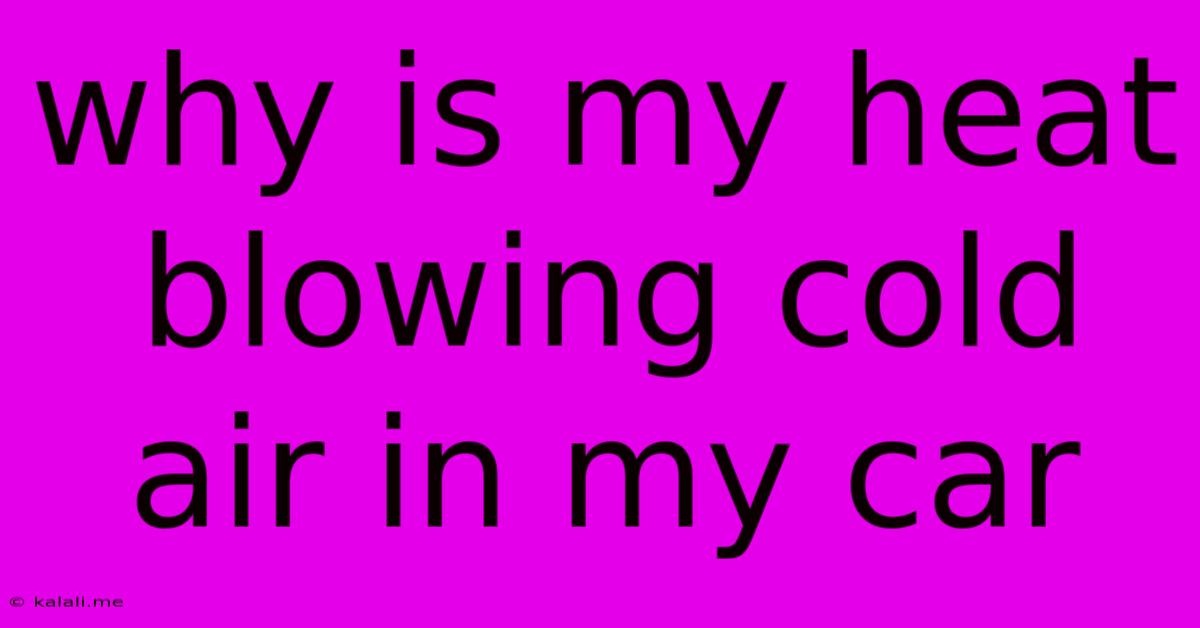Why Is My Heat Blowing Cold Air In My Car
Kalali
May 21, 2025 · 4 min read

Table of Contents
Why is My Car Heat Blowing Cold Air? A Comprehensive Troubleshooting Guide
Is your car's heater suddenly blowing cold air instead of the warm, cozy comfort you expect? This is a frustrating problem, especially during colder months. This comprehensive guide will walk you through the most common reasons why your car's heat isn't working and offer troubleshooting steps to help you get back to a toasty ride. We'll cover everything from simple fixes you can check yourself to more complex issues that may require professional help.
Understanding Your Car's Heating System
Before we dive into troubleshooting, it's helpful to understand the basics. Your car's heating system uses coolant (a mixture of antifreeze and water) heated by your engine. This hot coolant flows through a heater core located behind your dashboard. A fan blows air over the heater core, warming the air before it's directed into your car's cabin. Any disruption in this system can result in cold air blowing from your vents.
Common Reasons for Cold Air from Car Heater
Here are some of the most frequent culprits behind a malfunctioning car heater:
1. Low Coolant Levels: This is often the simplest and easiest problem to solve. Check your coolant reservoir (usually a translucent plastic tank near your engine). If the coolant level is low, your system may not have enough fluid to heat effectively. Adding coolant is crucial, but ensure your engine is cool before doing so to avoid burns. Consult your owner's manual for the correct type of coolant to use.
2. Leaking Coolant: If your coolant level is consistently low despite refilling, you likely have a leak somewhere in the system. This could be a leak in the radiator, hoses, water pump, or heater core itself. Inspect your hoses and radiator carefully for any visible cracks or damage. A leaking heater core often results in a sweet smell inside the car. A leak requires professional repair.
3. Thermostat Issues: The thermostat regulates the flow of coolant through the engine. A faulty thermostat might prevent coolant from reaching the heater core, resulting in cold air. A stuck closed thermostat is a common problem. This requires replacement.
4. Malfunctioning Water Pump: The water pump circulates coolant throughout the engine and heating system. If the water pump is failing, coolant won't circulate properly, leading to insufficient heat. A failing water pump will often make a whining or groaning noise.
5. Bleeder Valve Problems: Air pockets in the cooling system can impede the flow of coolant. Bleeder valves are designed to release trapped air. If your system hasn't been properly bled, this could cause heating issues. Check your owner's manual for the location and procedure for bleeding your car's cooling system.
6. Heater Core Problems: The heater core itself can become clogged, corroded, or leak. A clogged heater core restricts coolant flow, while a leaking one will lose coolant and compromise heating effectiveness. Repairing or replacing a heater core is usually a significant job best left to a professional.
7. Faulty Blower Motor or Resistor: The blower motor is responsible for pushing air through the vents. A malfunctioning blower motor or its resistor (which controls fan speed) can prevent air from flowing, even if the coolant is hot. A clicking sound from the blower motor often indicates a problem.
8. Blend Door Issues: The blend door controls the mix of hot and cold air. A broken or malfunctioning blend door can prevent hot air from reaching the vents. Repairing this often involves disassembly of parts of the dashboard.
When to Seek Professional Help
If you've checked the coolant level, hoses, and have basic mechanical knowledge, you might be able to tackle simple fixes. However, if the problem persists or involves more complex components like the water pump, thermostat, heater core, or blend door, it's best to consult a qualified mechanic. Attempting repairs beyond your skill level can lead to further damage and increased repair costs.
By systematically checking these components, you'll be well on your way to identifying the source of the problem and getting your car's heater back in working order. Remember safety first! Always let your engine cool down completely before working on any part of the cooling system.
Latest Posts
Latest Posts
-
Can I Take Flowers On A Plane
May 21, 2025
-
How To Charge Li Po Battery
May 21, 2025
-
Area Of A Triangle With Vectors
May 21, 2025
-
How Do You Say Excuse Me In Spanish
May 21, 2025
-
Credit Card Balance In Credit Positive
May 21, 2025
Related Post
Thank you for visiting our website which covers about Why Is My Heat Blowing Cold Air In My Car . We hope the information provided has been useful to you. Feel free to contact us if you have any questions or need further assistance. See you next time and don't miss to bookmark.